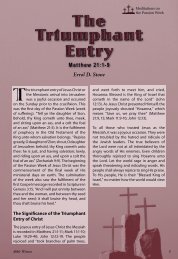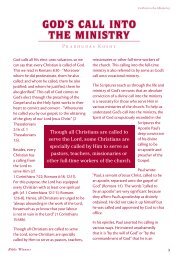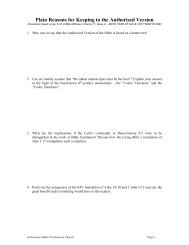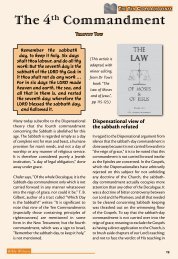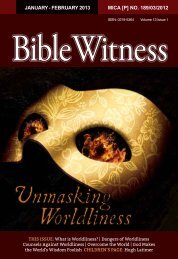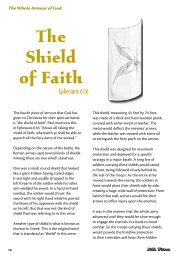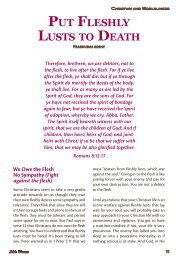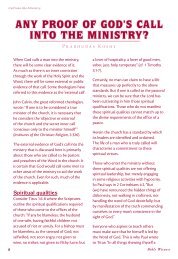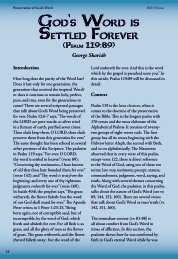Facts About Prayer
Facts About Prayer
Facts About Prayer
- No tags were found...
Create successful ePaper yourself
Turn your PDF publications into a flip-book with our unique Google optimized e-Paper software.
Basics of <strong>Prayer</strong><strong>Facts</strong> <strong>About</strong> <strong>Prayer</strong>Prabhudas KoshyIn these days, prayer in the Christian realm is increasingly putting on thecharacteristics of unbiblical mysticism of the oriental religions. <strong>Prayer</strong>s of Christiansought to be guided and moulded by biblical injunctions and patterns of prayer. Thefollowing characteristics of biblical prayer can be of help to maintain proper prayerhabits.<strong>Prayer</strong> should always be Godward<strong>Prayer</strong> is unidirectional – believersspeaking to God and Him alone.Philippians 4:6 says, “Let your requestsbe made known unto God” (cf.Nehemiah 4:9; Acts 12:5). Jesus said,“Thou shalt worship the Lord thy God,and him only shalt thou serve” (Matthew4:10). Never does the Bible speak ofprayer as a request made to dead saints,angels or demons. In truth, the Bibleprohibits any form of prayer to idols,spirits of the dead persons and devils(Deuteronomy 18:9-13; Leviticus 9:31;20:6; 2 Kings 17:17; Psalm 115:4-8;Zechariah 10:2). No man, whether deador alive, is worthy of our dependence. “Itis better to trust in the LORD than toput confidence in man” (Psalm 118:8).“Trust in him at all times; ye people,pour out your heart before him: God is arefuge for us. Selah” (Psalm 62:8).Unfortunately, there are many who claimto be Christians but practise necromancy(praying to the dead) and other forms ofprayer and worship that are abominableto God. It is not uncommon nowadays tohear some charismatic preachers talkingto the devil in the midst of their prayers.These practices, biblically-speaking, aredistortions of prayer. <strong>Prayer</strong> should onlybe rendered unto God.16 Bible Witness
Basics of <strong>Prayer</strong><strong>Prayer</strong> provides immediate access to GodTo all true Christians, prayer meansinstant access to God. Paul affirmed thistruth in Ephesians 2:18 – “For throughhim we both have access by one Spiritunto the Father” (cf. Romans 5:2).Likewise, Hebrews 4:16 declares, “Let ustherefore come boldly unto the throne ofgrace, that we may obtain mercy, and findgrace to help in time of need.” Christianscan have boldness in the fact that they canhave access to God’s gracious throne anytime they need His help.All those who have been reconciledto God through Christ can have theassurance that God is ever ready to heartheir prayers. In fact, because God isomnipresent (God is everywhere regardlessof time or circumstances) and omniscient(God is all-knowing), He not only hearsprayer immediately but even knows thecontent of prayer before it is formulatedby the one praying. Isaiah 65:24 says,“And it shall come to pass, that beforethey call, I will answer; and while they areyet speaking, I will hear.” Psalm 145:18promises, “The LORD is nigh unto allthem that call upon him, to all that callupon him in truth” (cf. Psalms 50:15; 91:15).<strong>Prayer</strong> is independent of ritualistic posture and activitiesThe Bible records God’s people prayingin various physical positions. Prayingin various circumstances necessitatesdifferent postures. In the Bible, peopleprayed standing (Genesis. 24:12-14),lifting up their hands (1 Timothy 2:8),sitting (Judges 20:26, 2 Samuel 7:18),kneeling (Daniel 6:10; Mark 1:40),looking upward (John 17:1), bowingdown (Exodus 34:8), placing their headsbetween their knees (1 Kings 18:42),lying down on their bed (Psalms 4:4;63:6), bowing on their bed (1 Kings 1:47),pounding on their breasts (Luke 18:13),facing the temple (Daniel 6:10), andprostrating (Mark 14:35; Revelation 7:11).The above brief review indicates that inthe Bible, there is not a particular postureof prayer. Postures are important onlyto the extent that they are the externalexpression of reverence, inner feelingsand commitment to the Lord. No singleposture is able to express all feelings of thepraying man. Hence, we find in Scripturea diversity of options and possibilities.One should adopt his posture of prayerin a reverential manner. Our posture inprayer should be the reflection of ourhearts, whether it be hearts overwhelmedwith the cares of life, hearts overawed bythe majesty of God or hearts hushed inhumble obedience to God.Above all, the Bible emphasizes theposture of the heart more than theexternal posture. Isaiah 29:13 admonishesus: “Wherefore the Lord said, Forasmuchas this people draw near me with theirmouth, and with their lips do honour me,but have removed their heart far from me,and their fear toward me is taught by theprecept of men.” Jesus also warned againstthe hypocritical prayer postures – “Andwhen thou prayest, thou shalt not be asthe hypocrites are: for they love to praystanding in the synagogues and in thecorners of the streets, that they may beseen of men. Verily I say unto you, Theyhave their reward” (Matthew 6:5).Bible Witness 17
Basics of <strong>Prayer</strong><strong>Prayer</strong> can be offered anywhereWe are not required to be in a churchbuilding or a sacred place in order to prayto God. (Of course, this fact should notbe cited as an excuse for forsaking churchprayer meetings and worship services.)The Bible records people praying in allsorts of places: in a closet (Matthew 6:6),before the congregation (2 Chronicles6:13), as a church (Acts 2:42-47), ina garden (Matthew 26:36-44), on amountainside (Luke 6:12), in a home(Acts 9:39-40), by a river (Acts 16:13), onthe shore (Acts 21:5-6), while sinking inthe sea (Matthew 14:30), on the way bythe well (Genesis 24:11-27), in the temple(1 Kings 8:22-53), in battle (2 Chronicles13:14-15), in a cave (1 Kings 19:9-10), inbed (Psalm 4:3-4), in the stomach of afish (Jonah 2:1-10), on a housetop (Acts10:9), in a prison (Acts 16:23-26), in thewilderness (Luke 5:16) and on a cross(Luke 23:33-34, 46).In 1 Timothy 2:8, Paul said, “I willtherefore that men pray everywhere.” Forthe Spirit-filled Christian, every placebecomes a place of prayer.<strong>Prayer</strong> can be offered any timeA believer is always aware of hisinsufficiency and therefore the need tolive in total dependence on God at alltimes. The Bible records the testimony ofthose who cried unto God day and night(Psalm 88:1; Luke 2:37; 1 Thessalonians3:10; 1 Timothy 5:5; 2 Timothy 1:3).Everyone who humbly accepts hisinsufficiency and dependence on God willbe eager to pray always. So Jesus exhorted:“Men ought always to pray, and not tofaint” (Luke 18:1).Scripture records people praying threetimes a day (Daniel 6:10), in the morning(Psalm 5:3), in the evening (1 Kings 18:36),before meals (Matthew 14:19), aftermeals (Deuteronomy 8:10), at the ninthhour (Acts 3:1), at bedtime (Psalm 4:4),at midnight (Acts 16:25), day and night(Luke 2:37; 18:7),often (Luke 5:33),when they areyoung (Jeremiah3:4), when they areold (Daniel 9:2-19),when they are introuble (2 Kings19:3-4), every day(Psalm 86:3), andalways (Luke 18:1;1 Thessalonians5:17).18 Bible Witness
Basics of <strong>Prayer</strong><strong>Prayer</strong> has no language barrier<strong>Prayer</strong> has no language barrier. Eventhough man thinks and speaks indifferent languages, God understands allof them. He is the God ofall nations and Scripturesays, “All nations whomthou hast made shallcome and worship beforethee, O Lord; and shallglorify thy name” (Psalm86:9). This certainlygives evidence to the fact that languageis no barrier when it comes to praying toGod (Acts 2:4, 11; Acts 10:46). God evensearches the heartsof His children andthereby knows theirmotives, needs anddesires, no matterwhat language theythink or speak in(Romans 8:27).<strong>Prayer</strong> can be presented to God in various formsSince God knows both the hearts andthoughts of everyone, prayer may beexpressed mentally, audibly or in song(psalms). In times of great trials, wemay prayerfully sit before His thronethough without the power to express ourthoughts. In times like these, the HolySpirit searches our hearts and makes ourfeelings and thoughts known unto God(Romans 8:26; Hebrews 4:15).There is a time for offering up our prayersin a proper, clear and formal manner.This should be the case,especially when we praybefore a congregationor fellowship group.However, we can comebefore God with brokenhearts and weeping,crying audibly (1 Samuel1:10; Psalm 34:18). Attimes, it may be expressed in the form ofmaking a vow (1 Samuel 1:11; Acts 18:18),making sacrifices (Psalm 20:1-3) andsinging songs (Psalm 59:16, 17; Acts 16:25).People in the Bible prayed sitting in ashes(Job 1:20-21; 2:8), wearing sackcloth(Psalm 35:13), crying with tears (Psalm6:6), smiting their breasts (Luke 18:13),throwing dust on their heads (Joshua 7:6),tearing garments (1 Kings 21:27), fasting(Deuteronomy 9:18), sighing (Ezra 9:4-15),groaning (Psalm 6:4-6), crying out loud(Hebrews 5:7) and sweating as if bleeding(Luke 22:44).Sometimes, Christiansmay engage in prayerfor several days (Esther4:16), several hours – allthrough the night(Luke 6:12), or shortejaculatory prayers(Matthew 14:30). Somewould even take time to pray several timesa day (Daniel 6:10).Conclusion<strong>Prayer</strong> is to be a total way of life—an openand continual communion with God. Itis not limited or restrained by factors suchas time, posture and place. Under anycircumstance, a child of God can call onHis God.Bible Witness 19




